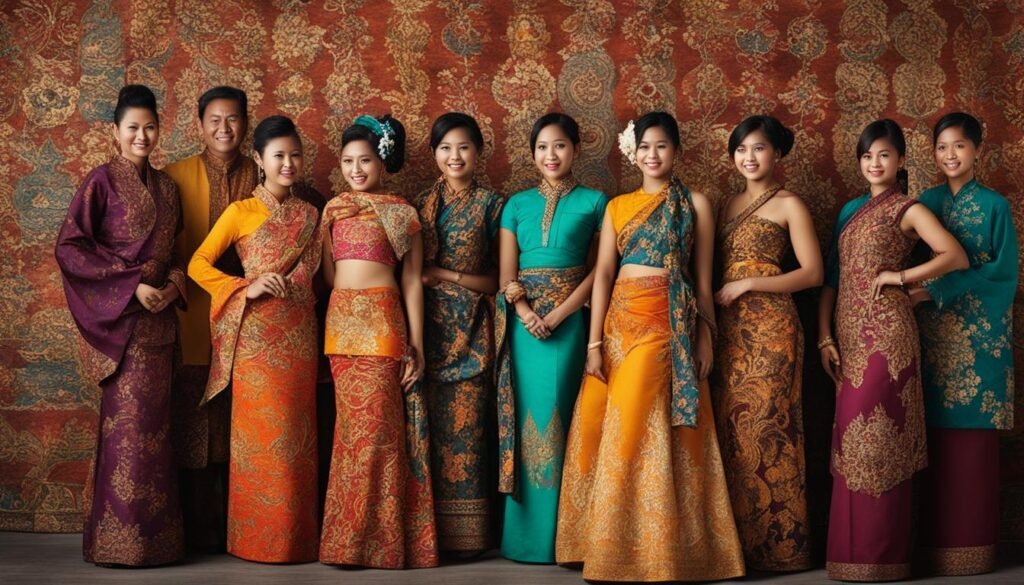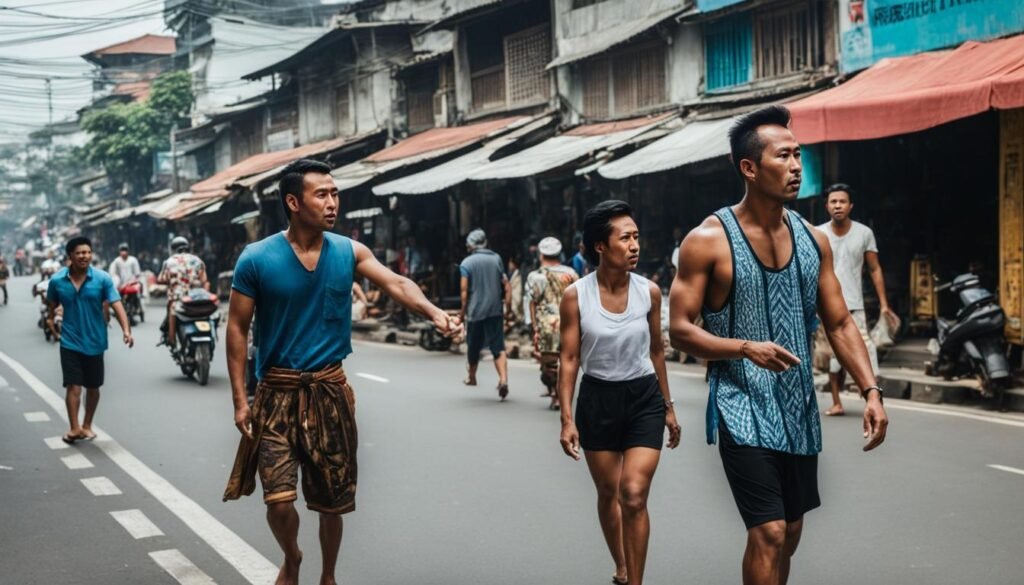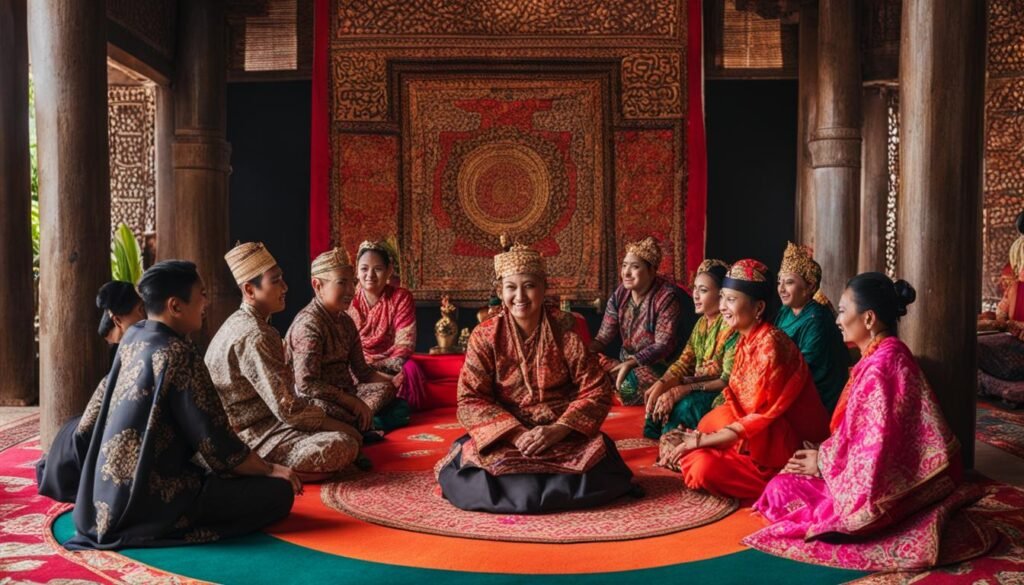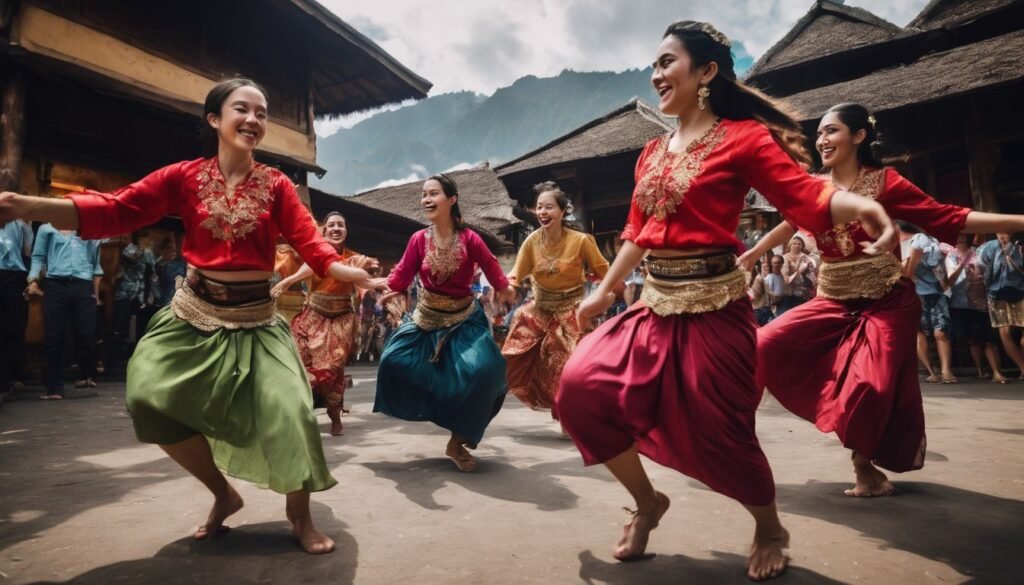As you pack your suitcase for an Indonesian adventure, you might find yourself pondering, “Can I wear shorts in Indonesia?” After all, with its tropical climate, the temptation to prioritize comfort seems logical. However, diving into the fashion realm of this culturally rich nation requires understanding the delicate balance between personal comfort and cultural norms in Indonesia.
While the sun-kissed beaches and luxury resorts might invite a more relaxed dress code, veering towards tourist clothing in Indonesia, modesty holds a place of reverence within the intricate social fabric of the country. In fact, what to wear in Indonesia often aligns closely with respecting the local communities and religious mores. As you navigate the vibrant streets and tranquil temples, it becomes apparent that appropriate clothing in Indonesia mirrors a broader narrative of courtesy and sensitivity.
With this in mind, a deeper appreciation of Indonesian customs can shape not just your wardrobe, but also enhance your overall travel experience. It’s less about asking if you can wear shorts, and more about discovering how fashion in Indonesia extends an unwritten invitation to understand and respect this diverse land.
Key Takeaways
- Awareness of the cultural norms in Indonesia is essential for choosing appropriate clothing.
- Resort areas may offer more leeway, but modesty reigns supreme in rural regions.
- Familiarize yourself with religious site requirements, often necessitating full-coverage attire.
- Fashion in Indonesia is deeply tied to respect for community values and traditions.
- Being mindful of what to wear can significantly enhance your interactions with locals.
- Tourist clothing in Indonesia can be versatile, but should always consider cultural sensitivities.
Understanding Indonesia’s Rich Cultural Tapestry
Traveling to Indonesia presents a unique opportunity to immerse yourself in an environment that is a testament to human diversity and natural beauty. Before you pack your bags, it’s essential to gain a glimpse into the intricate patchwork of Indonesia’s cultural and environmental landscapes.
The Diversity of Indonesian Islands and Cultures
From the bustling streets of Jakarta to the tranquil villages in the Baliem Valley, each of Indonesia’s islands offers a distinct experience sculpted by centuries of heritage. As you traverse this sprawling nation, the dress code in Indonesia transitions with its cultures. What is considered acceptable attire in Indonesia’s urban heart may diverge significantly from clothing expectations on more remote islands such as Flores or Sumba.
Climate Variances Across the Archipelago
The question, “Can I wear shorts in Indonesia?” often arises due to the country’s predominantly warm weather. However, given the climate’s variability, from tropical humidity to highland crispness, your wardrobe should adapt to regional weather patterns. Rainfall might dictate your clothing choices as much as cultural norms, especially in regions like Sumatra where the heavens open with vigor.

Linguistic Variety and the Importance of Bahasa Indonesia
An understanding of Bahasa Indonesia, even if it’s just a few courteous phrases, can endear you to locals and signify a respect for the cultural norms in Indonesia. Language ties into every aspect of life, including how one should dress. In a country where a respectful greeting and a modest outfit go hand in hand, knowledge of the local tongue underscores the importance of cultural awareness.
- When in cosmopolitan areas, a bit more freedom in what you wear might be observed.
- In rural communities, it’s recommended to observe clothing restrictions in Indonesia by choosing longer sleeves and pants.
- Always be prepared to cover up when visiting places of worship, regardless of the region.
Remember, when you dress to respect the local customs, you’re not only making a fashion statement but also weaving your own thread into the colorful fabric of Indonesia’s cultural tapestry.
Navigating Indonesia’s Climate: What to Wear
As you pack for Indonesia, you might be tempted to fill your suitcase with shorts and sleeveless tops, pondering can I wear shorts in Indonesia? In the numerous tourist destinations, it’s common to see visitors adorned in summer attire, embracing the fashion in Indonesia. Yet, it’s vital to consider the local customs and climates you’ll encounter across this extensive archipelago.

It’s true that humidity and heat dominate the climate, making natural fiber clothing like cotton an excellent choice for comfort. This type of clothing not only copes well with the humidity but also aligns with what to wear in Indonesia to stay cool. However, the appropriateness of your attire extends beyond personal comfort and enters the realm of cultural respect—especially outside the confines of tourist hotspots.
Here are some suggestions for tourist clothing in Indonesia that strike a balance between comfort and cultural sensitivity:
- Opt for light, breathable fabrics that keep you cool while covering more of your skin.
- Carry a hat and wear sunscreen to protect against the intense tropical rays.
- Consider bringing a lightweight jacket or shawl for cooler highland regions or breezy evenings.
- Pack a more conservative set of clothes for visiting religious sites or entering rural villages.
Below is a guide that demonstrates the versatility needed in your wardrobe to enjoy the diverse experiences offered by Indonesia, without compromising on comfort or cultural respect.
| Area | Recommended Attire | Cultural Considerations |
|---|---|---|
| Tourist Resorts & Beaches | Shorts, T-shirts, Sandals, Swimwear | More liberal dress codes, but always carry a cover-up for communal areas |
| Highlands & Volcanoes | Warm layers, Long Pants, Hat | Dress warmly due to cooler temperatures; respect the tranquility with modest colors |
| Temples & Spiritual Sites | Long Skirts/Pants, Sarongs, Scarves | Cover shoulders and legs as a sign of respect at these holy places |
| Rural Villages | Long Sleeves, Maxi Dresses, Long Pants | Choose modest attire to honor local customs and traditions |
The essence of travel is not only about witnessing new places but also respecting the cultures that host us. While the balmy climate makes shorts an appealing choice for comfort, it’s necessary to assess when they’re appropriate. Whether it’s for protection against the sun or to respect the local culture, the question “can I wear shorts in Indonesia?” is often less about possibility and more about propriety. Sensitivity to culture and climate will ensure a more immersive and respectful experience as you explore the enchanting Indonesian archipelago.
Can I Wear Shorts in Indonesia?
Traveling through Indonesia presents an intricate tapestry of climates and cultures, each dictating its unique brand of clothing etiquette. When packing your suitcase, you might wonder if the casual comfort of shorts aligns with the local dress code in Indonesia. Here, we unveil the layers of clothing restrictions in Indonesia to help you blend in harmoniously with the cultural norms.
The Social Etiquette of Dress Code in Indonesia
In conservative and Muslim-dominated areas, modesty is not just appreciated—it’s expected. It’s essential to recognize that, while beach resorts may offer leniency, the broader Indonesian society holds an affinity for more covered attire. Shorts, especially in sacred spaces, could be perceived as a sign of disrespect. Grasping the social nuances of acceptable attire in Indonesia provides a window into the heart of its communal life and customs.
Acceptable Attire in Different Regions of Indonesia
Indonesia is a canvas of regional diversity, and so is its fashion. The balmy beaches of Bali may invite a pair of shorts, yet a visit to the temples in Yogyakarta calls for a sarong over your legs. In metropolitan hubs like Jakarta, you might get by with more westernized clothing; whereas in Aceh, adherence to Sharia law means dressing guidelines are stricter. Aligning with these cultural norms in Indonesia is a compelling expression of your respect for the local way of life.

Assessing Appropriate Clothing for Activities and Events
Attire in Indonesia isn’t solely about location; it’s also event-specific. Preparing for a business meeting? A smart-casual ensemble works perfectly. Heading to a traditional ceremony? It’s time to forgo the shorts and slip into something that covers the shoulders and knees. The thread weaving through all your clothing choices should be decency—a testament to your understanding of and empathy with Indonesian cultural standards.
Ultimately, can you wear shorts in Indonesia? Yes, within the tourist confines and according to the activity. But to truly honor the places you visit, it’s best to observe local customs and dress a step above comfort to convey cultural sensitivity. By doing so, you forge deeper connections with the people and places defining your Indonesian adventure.
Religious Considerations and Clothing Restrictions
As you plan your Indonesian adventure, it’s essential to keep in mind that the nation’s vibrant tapestry of religious beliefs influences not only the spiritual ethos but also everyday fashion norms. Understanding and adhering to these cultural norms in Indonesia will not only enhance your travel experience but also foster a deeper connection with local communities. When considering what you can wear in Indonesia, remember that religious considerations are of paramount importance, particularly when visiting places of worship or participating in sacred ceremonies.
Dress Code While Visiting Religious Sites
The sanctity of Indonesia’s religious sites is reflected in their strict dress codes. Can you wear shorts in Indonesia while traipsing through ancient temples or elegant mosques? The simple answer is no. Whether you find yourself at a serene Balinese temple or walking through the majestic corridors of an Indonesian mosque, modest dress is mandatory. Sarongs are a common requirement for both men and women, serving as a sign of respect for the divine and the devout alike. Women are often expected to wear shoulder coverings, a nod to the cultural norms where modesty takes precedence.
Understanding Muslim, Hindu, and Christian Clothing Norms
Indonesia’s distinction as the country with the largest Muslim population means that Islamic clothing restrictions in Indonesia play a significant role in shaping appropriate attire. However, Hindu and Christian communities also contribute to the colorful palette of religious attire. In Hindu-dominated regions like Bali, you’ll notice a lean towards more colorful and ceremonial dress, especially during religious festivals. In areas with prominent Christian populations, Sunday best is often the norm for church services. Each religious context offers its own unique set of customs, and being mindful of these can transform you from a mere tourist to a well-informed visitor.
How Local Traditions Affect Tourist Clothing Choices
As a traveler, you might wonder about the balance between comfort and compliance with clothing restrictions in Indonesia. The local traditions significantly affect tourist clothing choices, demanding a sensitive approach to dressing. When packing your suitcase, factor in the religious considerations in Indonesia and opt for acceptable attire that allows you to explore freely while still paying homage to the decorum of the diverse cultures you encounter. By doing so, you engage with cultural norms in a manner that demonstrates respect and understanding, enriching your travel experience in this fascinating archipelago.
FAQ
Can I wear shorts in Indonesia?
While you can wear shorts in some tourist areas and resorts in Indonesia, it is advisable to wear longer clothing in non-resort areas, especially when visiting rural or predominantly Muslim regions, to adhere to local cultural norms and show respect.
What are the cultural norms in Indonesia regarding fashion?
Cultural norms in Indonesia lean towards modesty. It’s recommended to dress modestly, particularly in Muslim-majority areas. For religious sites and ceremonies, conservative clothing is a must, regardless of your personal beliefs.
What is appropriate clothing in Indonesia?
Appropriate clothing in Indonesia generally means garments that cover shoulders and knees, particularly when visiting religious sites or rural areas. Light, breathable fabrics are advisable due to the tropical climate.
How does fashion vary across Indonesia?
Indonesia’s fashion varies widely, reflecting its cultural diversity. In urban and tourist-centric areas, Western-style clothing is more common and acceptable. However, more traditional and modest attire is expected in less urbanized islands and when participating in cultural and religious events.
What should tourists wear in Indonesia to be respectful of the local culture?
Tourists should aim for modest, non-revealing clothing to respect the local culture. This includes clothes that cover the shoulders and knees, especially when visiting religious sites or when in more conservative regions.
How do clothing restrictions vary across Indonesia?
Clothing restrictions can be more stringent in religious and rural areas, where modesty is paramount. Urban and tourist regions are more liberal, but it’s still important to be mindful of how you dress to respect local customs and traditions.
Can I wear shorts in Indonesia during religious ceremonies or in temples?
Shorts are generally not acceptable during religious ceremonies or in temples in Indonesia. It’s best to wear a sarong and ensure that your shoulders are also covered, following the specific dress codes of the religious site you are visiting.
What should I know about the dress code in Indonesia?
The dress code in Indonesia varies by location and situation, but modesty is a key consideration. For everyday wear in non-tourist areas, longer garments are preferred, and for religious sites, covering up is essential. Always be prepared to adapt your attire to respect local customs.
Is there a difference in acceptable attire in different regions of Indonesia?
Yes, acceptable attire can differ considerably. For instance, Bali, with its Hindu influence, may be less conservative than Aceh, a region that follows Islamic Sharia law. Knowing the cultural background and religious customs of each region is essential when choosing what to wear.
How should I choose appropriate clothing for activities and events in Indonesia?
Appropriateness depends on the nature of the activity. For outdoor adventures, practicality and comfort are key, whereas cultural and religious events require modest, respectful attire. Checking local customs and asking for advice when in doubt is the best approach.
What are the religious considerations I should keep in mind when dressing in Indonesia?
Be aware of the dominant religion in the area you are visiting. Muslim-majority areas require more conservative clothing, Christian regions may be a bit more relaxed, and in Hindu areas like Bali, wearing a sarong and sash at temples is customary. Always err on the side of modesty.
How do Muslim, Hindu, and Christian clothing norms affect what tourists should wear?
Muslim norms favour more covered attire, Hindu customs may require specific garments like sarongs in temples, and Christian communities may have less stringent requirements. However, regardless of religious affiliation, dressing modestly is a universally accepted practice among tourists visiting Indonesia.
In what ways do local traditions affect tourist clothing choices?
Local traditions dictate that tourists should dress modestly and respectfully, in line with community values. Observing the locals and asking for guidance can help tourists make appropriate clothing choices that show respect for traditional ways of life.



